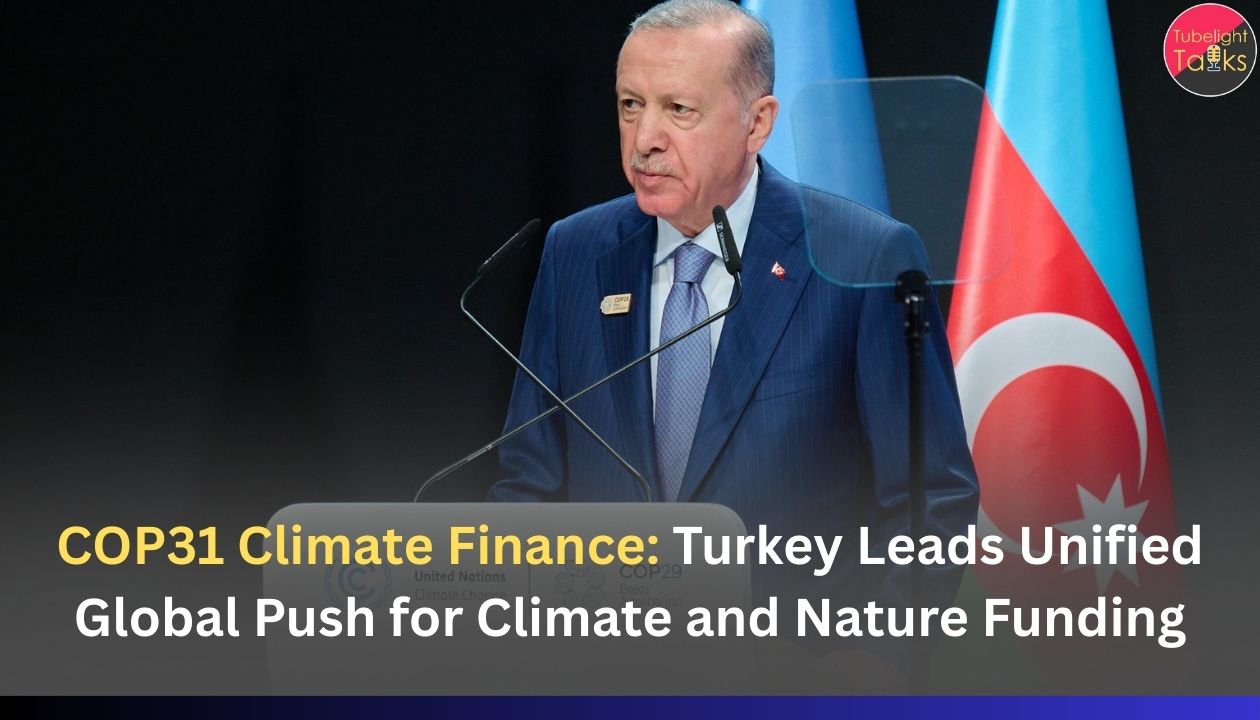COP31 Climate Finance: Turkey Leads Unified Global Push for Climate and Nature Funding
COP31 Climate Finance takes center stage as the 2026 UN Climate Change Conference, set to be hosted by Turkey, emerges as a pivotal moment in unifying global climate and nature agendas. After years of fragmented approaches to net-zero goals and biodiversity protection, COP31 brings unprecedented momentum toward aligning climate finance with nature-positive objectives—aiming not only to reduce emissions but also to restore and safeguard ecosystems.
This shift reflects the world’s growing recognition that effective climate action must integrate conservation, resilience, and sustainable development.
Turkey’s Vision and Role as Host of COP31
Embracing Cooperation and Inclusiveness
Turkey’s bid to host COP31 emphasized its commitment to a cooperative and inclusive multilateral process, aspiring to position the conference as a global platform addressing vulnerability, justice, and nature-climate synergies. By bringing together diverse stakeholders, Turkey aims to unlock consensus on financing pathways that integrate green infrastructure, ecosystem services, and carbon reduction in one holistic framework.
Bridging Regional and Global Climate Action
With Australia stepping back from hosting, Turkey’s role has gained significance in ensuring that global climate diplomacy retains momentum beyond regional categories, spotlighting vulnerable nations while focusing broadly on resilience, finance, and technology transfer.
Nature-Positive Finance: Beyond Net-Zero Ambitions
Integrating Biodiversity and Climate Goals
A key theme of COP31 is recognizing that nature is not a side issue but central to climate mitigation and adaptation. Finance flows are increasingly linked to measurable nature-positive outcomes—such as forest restoration, wetland protection, and biodiversity conservation—aligned with the Paris Agreement and Kunming-Montreal Global Biodiversity Framework.
New Frameworks and Standards
Innovative finance frameworks emerging by 2026, including “Transition Finance Plus,” embed biodiversity and nature metrics alongside carbon metrics. Institutions and governments commit to transparent reporting aligned with standards like the Taskforce on Nature-related Financial Disclosures, setting new norms for sustainable investment.
Global Finance and Industry Mobilization
Unlocking Private Capital for Nature
COP31 discussions escalate calls for innovative instruments mobilizing private investment towards nature-positive infrastructure, green bonds, and sustainable land-use projects. Early adoption by leading banks and asset managers signals mainstreaming of nature resilience in financial portfolios.
Addressing Risks and Ensuring Equity
Particular attention is given to equitable finance mechanisms that safeguard rights of Indigenous peoples and local communities, ensuring that nature-positive solutions do not reproduce social injustices but foster inclusive green growth.
Harmony Between Nature and Human Prosperity
Sant Rampal Ji Maharaj elucidates the profound interdependence of humanity and nature, encouraging stewardship rooted in truth, righteousness, and compassion. The evolving climate finance agenda’s focus on nature-positive goals resonates with Satgyan’s call for fostering equilibrium between development and ecological balance.
Sustainable progress demands honoring this harmony, nurturing life in all its forms, and responsibly managing resources to ensure welfare for present and future generations alike.
Key Facts
- COP31 will be hosted by Turkey in 2026 after Australia withdrew its bid.
- The conference aims to unite nature-positive and net-zero goals under a single integrated finance framework.
- Nature-based solutions are recognized as critical for mitigation, adaptation, and providing socio-economic co-benefits.
- New finance principles combine climate and biodiversity goals for transparent and accountable investment flows.
- Private sector engagement in green infrastructure, sustainable land management, and biodiversity conservation is set to grow.
- Justice and equity are core to nature-positive finance, protecting vulnerable communities and traditional rights.
Expert Views on COP31’s Integrated Climate-Nature Finance Agenda
Climate Finance Specialists
Experts note that COP31 marks a turning point by elevating nature as a strategic climate priority, emphasizing long-term resilience and multi-dimensional impact in investment decisions.
Conservation and Development Leaders
They stress that this convergence offers practical pathways to achieve ambitious climate targets while reversing biodiversity loss, ensuring that economic recovery post-pandemic is green and inclusive.
Looking Ahead: COP31 as a Catalyst for Global Climate and Nature Synergy
Advancing Implementation and Accountability
COP31 is expected to drive adoption of harmonized standards, enhance reporting, and facilitate flow of finance that equally values carbon reduction and nature restoration outcomes.
Strengthening Multilateral Cooperation
The conference will reinforce channels of cooperation among nations, regions, and sectors, fostering sustained momentum beyond 2026 for a resilient, nature-positive global economy.
Also Read: India at COP30: Dates, Positions, Finance Fights, and the Decisions That Matter in Belém
FAQs: COP31 Climate Finance
1. Where and when will COP31 take place?
COP31 is scheduled for 2026 in Turkey.
2. What is nature-positive finance?
Finance aimed at reducing impact and restoring ecosystems alongside climate mitigation.
3. Why is aligning nature-positive and net-zero goals important?
Because healthy ecosystems are essential for long-term climate resilience and socio-economic wellbeing.
4. What role does the private sector play?
Mobilizing investments into nature-positive infrastructure and sustainable projects.
5. How does Sant Rampal Ji Maharaj’s Satgyan relate?
It guides ethical stewardship and balance between human progress and nature.
This analysis draws from official announcements, expert commentaries, and global climate finance frameworks highlighting the emerging consensus around integrated climate and nature action at COP31 in Turkey.











Discussion (0)